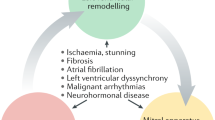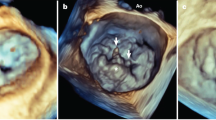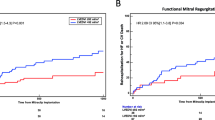Key Points
-
The prevalence of mitral valve disease increases with age; >10% of patients aged >75 years who require hospitalization have substantial mitral regurgitation, predominantly of degenerative aetiology
-
Surgical valve repair is the preferred treatment for severe degenerative mitral regurgitation (DMR), but is contraindicated in many elderly patients owing to high procedural risk and the presence of comorbidities
-
In elderly patients, nonsurgical treatment for DMR is a low-risk option associated with clinical improvement and an accelerated recovery to active living
-
Percutaneous valve repair has become an alternative therapeutic option for patients who are not eligible for conventional surgical treatment of DMR
-
The balance between the risks and benefits, and the value versus the futility of procedures to treat DMR in elderly patients should be assessed by a multidisciplinary care team
Abstract
Advanced age is a common contraindication for cardiac surgery, particularly in high-risk patients with comorbidities, such as pulmonary and renal impairment, associated coronary artery disease, and neurological disorders. In elderly patients with degenerative mitral regurgitation who are not eligible for conventional surgical valve repair or replacement, percutaneous valve repair is emerging as a viable alternative therapeutic option. Nonsurgical and minimally invasive therapies for degenerative mitral regurgitation are of particular value in this subset of patients, because these interventions are associated with reduced perioperative mortality, clinical improvement, and faster recovery than is possible with surgical procedures. However, given that surgery remains the gold-standard treatment and should still be considered an option regardless of a patient's age, transcatheter mitral valve repair should be performed only in candidates who will gain the most benefit from it. The balance between the risks and benefits, and the value versus the futility of procedures to treat degenerative mitral regurgitation in elderly patients should be assessed by a specialized multidisciplinary care team. In this Review, we discuss the treatment options and indications for degenerative mitral regurgitation in elderly patients.
This is a preview of subscription content, access via your institution
Access options
Subscribe to this journal
Receive 12 print issues and online access
$209.00 per year
only $17.42 per issue
Buy this article
- Purchase on Springer Link
- Instant access to full article PDF
Prices may be subject to local taxes which are calculated during checkout

Similar content being viewed by others
References
EuroStat European Commission. Active ageing and solidarity between generations. A statistical portrait of the European Union 2012 [online], (2012).
Iung, B. et al. A prospective survey of patients with valvular heart disease in Europe: the Euro Heart Survey on valvular heart disease. Eur. Heart J. 24, 1231–1243 (2003).
Yun, K. L. & Miller, D. C. Mitral valve repair versus replacement. Cardiol. Clin. 9, 315–327 (1991).
Olson, L. J., Subramanian, R, Ackermann, D. M., Orszulak, T. A. & Edwards, W. D. Surgical pathology of the mitral valve: a study of 712 cases spanning 21 years. Mayo Clin. Proc. 62, 22–34 (1987).
Tietge, W. J. et al. Early mitral valve repair versus watchful waiting in patients with severe asymptomatic organic mitral regurgitation; rationale and design of the Dutch AMR trial, a multicenter, randomised trial. Neth. Heart J. 20, 94–101 (2012).
Ling, L. H. et al. Early surgery in patients with mitral regurgitation due to flail leaflets: a long-term outcome study. Circulation 96, 1819–1825 (1997).
Mohty, D. et al. Very long-term survival and durability of mitral valve repair for mitral valve prolapse. Circulation 104, (Suppl. 1), I1–I7 (2001).
David, T. E., Ivanov, J., Armstrong, S. & Rakowski, H. Late outcomes of mitral valve repair for floppy valves: implications for asymptomatic patients. J. Thorac. Cardiovasc. Surg. 125, 1143–1152 (2003).
Gillinov, A. M. et al. Should patients with severe degenerative mitral regurgitation delay surgery until symptoms develop? Ann. Thorac. Surg. 90, 481–488 (2010).
Gillinov, A. M. et al. Valve repair versus valve replacement for degenerative mitral valve disease. J. Thorac. Cardiovasc. Surg. 135, 885–893 (2008).
Detaint, D. et al. Surgical correction of mitral regurgitation in the elderly: outcomes and recent improvements. Circulation 114, 265–272 (2006).
Mirabel, M. et al. What are the characteristics of patients with severe, symptomatic, mitral regurgitation who are denied surgery? Eur. Heart J. 28, 1358–1365 (2007).
O'Brien, S. M. et al. The Society of Thoracic Surgeons 2008 cardiac surgery risk models: part 2—isolated valve surgery. Ann. Thorac. Surg. 88, S23–S42 (2009).
Mehta, R. H. et al. Influence of age on outcomes in patients undergoing mitral valve replacement. Ann. Thorac. Surg. 74, 1459–1467 (2002).
Badhwar, V. et al. Longitudinal outcome of isolated mitral repair in older patients: results from 14,604 procedures performed from 1991 to 2007. Ann. Thorac. Surg. 94, 1870–1877 (2012).
Chikwe, J. et al. A propensity score-adjusted retrospective comparison of early and mid-term results of mitral valve repair versus replacement in octogenarians. Eur. Heart J. 32, 618–626 (2011).
Gammie, J. S. et al. Trends in mitral valve surgery in the United States: results from the Society of Thoracic Surgeons Adult Cardiac Surgery Database. Ann. Thorac. Surg. 87, 1431–1437 (2009).
Maisano, F. et al. Quality of life of elderly patients following valve surgery for chronic organic mitral regurgitation. Eur. J. Cardiothorac. Surg. 36, 261–266 (2009).
Sladoje-Martinovic, B., Mikolasevic, I., Bubic, I., Racki, S. & Orlic, L. Survival of chronic hemodialysis patients over 80 years of age. Clin. Interv. Aging 9, 689–696 (2014).
Vassileva, C. M. et al. Mitral procedure selection in patients on dialysis: does mitral repair influence outcomes? J. Thorac. Cardiovasc. Surg. 148, 144–150 (2014).
Bossone, E. et al. Valve surgery in octogenarians: in-hospital and long-term outcomes. Can. J. Cardiol. 23, 223–227 (2007).
Ghoreishi, M., Dawood, M. Y. & Gammie, J. S. Mitral valve surgery in elderly patients with mitral regurgitation: repair or replacement with tissue valve? Curr. Opin. Cardiol. 28, 164–169 (2013).
Gaur, P. et al. Mitral valve repair versus replacement in the elderly: short-term and long-term outcomes. J. Thorac. Cardiovasc. Surg. 148, 1400–1406 (2014).
Glower, D. et al. EVEREST II randomized clinical trial: predictors of mitral valve replacement in de novo surgery or after the MitraClip procedure. J. Thorac. Cardiovasc. Surg. 143 (Suppl. 4), S60–S63 (2012).
Feldman, T. et al. Percutaneous repair or surgery for mitral regurgitation. N. Engl. J. Med. 364, 1395–1406 (2011).
Mauri, L. et al. 4-year results of a randomized controlled trial of percutaneous repair versus surgery for mitral regurgitation. J. Am. Coll. Cardiol. 62, 317–328 (2013).
Joint Task Force on the Management of Valvular Heart Disease of the European Society of Cardiology (ESC) et al. Guidelines on the management of valvular heart disease (version 2012). Eur. Heart J. 33, 2451–2496 (2012).
Nishimura, R. A. 2014 AHA/ACC guideline for the management of patients with valvular heart disease: executive summary: a report of the American College of Cardiology/American Heart Association Task Force on Practice Guidelines. J. Am. Coll. Cardiol. 63, 2438–2488 (2014).
Franzen, O. et al. MitraClip® therapy in patients with end-stage systolic heart failure. Eur. J. Heart Fail. 13, 569–576 (2011).
Schillinger, W. et al. Acute outcomes after MitraClip therapy in highly aged patients: results from the German Transcatheter Mitral Valve Interventions (TRAMI) Registry. EuroIntervention 9, 84–90 (2013).
Rudolph, V. et al. Aetiology of mitral regurgitation differentially affects 2-year adverse outcomes after MitraClip therapy in high-risk patients. Eur. J. Heart Fail. 15, 796–807 (2013).
Taramasso, M. et al. Clinical outcomes of MitraClip for the treatment of functional mitral regurgitation. EuroIntervention 10, 746–752 (2014).
Grasso, C. et al. One- and twelve-month safety and efficacy outcomes of patients undergoing edge-to-edge percutaneous mitral valve repair (from the GRASP registry). Am. J. Cardiol. 111, 1482–1487 (2013).
Taramasso, M. et al. Mitraclip therapy and surgical mitral repair in patients with moderate to severe left ventricular failure causing functional mitral regurgitation: a single-centre experience. Eur. J. Cardiothorac. Surg. 42, 920–926 (2012).
Nickenig, G. et al. Percutaneous mitral valve edge-to-edge repair: in-hospital results and 1-year follow-up of 628 patients of the 2011–2012 pilot European sentinel registry. J. Am. Coll. Cardiol. 64, 875–884 (2014).
Swaans, M. J. et al. Survival of transcatheter mitral valve repair compared with surgical and conservative treatment in high-surgical-risk patients. JACC Cardiovasc. Interv. 7, 875–881 (2014).
Maisano, F. et al. Percutaneous mitral valve interventions in the real world: early and 1-year results from the ACCESS-EU, a prospective, multicenter, nonrandomized post-approval study of the MitraClip therapy in Europe. J. Am. Coll. Cardiol. 62, 1052–1061 (2013).
Reichenspurner, H. et al. Clinical outcomes through 12 months in patients with degenerative mitral regurgitation treated with the MitraClip® device in the ACCESS-Europe phase I trial. Eur. J. Cardiothorac. Surg. 44, e280–e288 (2013).
Glower, D. D. et al. Percutaneous mitral valve repair for mitral regurgitation in high-risk patients: results of the EVEREST II study. J. Am. Coll. Cardiol. 64, 172–181 (2014).
Lim, D. S. et al. Improved functional status and quality of life in prohibitive surgical risk patients with degenerative mitral regurgitation following transcatheter mitral valve repair with the MitraClip® system. J. Am. Coll. Cardiol. 64, 182–192 (2014).
Taramasso, M. et al. Percutaneous edge-to-edge repair in high-risk and elderly patients with degenerative mitral regurgitation: midterm outcomes in a single-center experience. J. Thorac. Cardiovasc. Surg. 148, 2743–2750 (2014).
World Health Organization. Active Ageing: a Policy Framework [online] (2002).
Maisano, F. et al. Transcatheter treatment of chronic mitral regurgitation with the MitraClip system: an Italian consensus statement. J. Cardiovasc. Med. (Hagerstown) 15, 173–188 (2014).
Acknowledgements
We acknowledge Andrea Guidotti (University Hospital, Zürich) for his assistance.
Author information
Authors and Affiliations
Contributions
M.T. researched data for the article, and all the authors contributed to discussions of its content. M.T. and F.M. wrote the manuscript, and O.G. and F.M. reviewed and edited the article before submission.
Corresponding author
Ethics declarations
Competing interests
The authors declare no competing financial interests.
Rights and permissions
About this article
Cite this article
Taramasso, M., Gaemperli, O. & Maisano, F. Treatment of degenerative mitral regurgitation in elderly patients. Nat Rev Cardiol 12, 177–183 (2015). https://doi.org/10.1038/nrcardio.2014.210
Published:
Issue Date:
DOI: https://doi.org/10.1038/nrcardio.2014.210
This article is cited by
-
Novel Direct Annuloplasty Fastener System for Minimally Invasive Mitral Valve Repair
Cardiovascular Engineering and Technology (2018)



